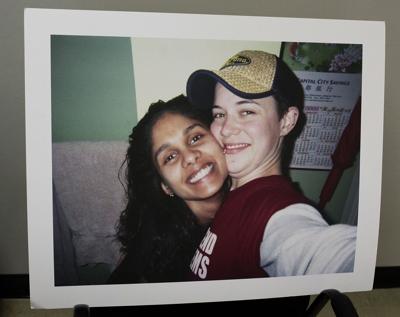A ÎÚÑ»´«Ã½ judge described the case as one involving “elements of violence, sexuality and sensationalism”— and it’s one that returns to court this fall when the convicted killer argues she’s ready for early release.
On Oct. 27, 2006, Dennis Hoy, 36, was bludgeoned to death with an axe while he slept in the west end apartment belonging to his girlfriend, Nicola Puddicombe, who was 32.
Police arrested Puddicombe and Ashleigh Pechaluk, then in her early 20s. The two women had become romantically involved. The Crown’s theory was they plotted to kill Hoy so they could be together and Puddicombe could inherit his $250,000 life insurance policy.
Initially, Pechaluk told police — after maintaining her innocence through 20 hours of interrogation — that she alone killed Hoy.
The two women were tried separately, and Pechaluk went first. Her “confession” wasn’t admitted at trial because she had not been advised of her right to counsel.
She testified she had nothing to do with killing Hoy, and the jury acquitted her in June 2009. Puddicombe’s trial followed that autumn at the downtown ÎÚÑ»´«Ã½ courthouse.
In a shocking betrayal, Pechaluk testified that on the night of the murder, Puddicombe came to her and pressured her to go through with the plan, but she refused. She said she woke up and the GO Transit special constable was dead.
In December 2009, Puddicombe was convicted by a different jury of first-degree murder. She was sentenced to life in prison, where she has remained since her arrest on May 16, 2007.
Sixteen years after her conviction, Puddicombe, now 52, is seeking early release under the faint hope clause.Â
The faint hope clause is no longer available in Canada for offences committed after Dec. 2, 2011. Before it was repealed, it allowed individuals serving a life sentence for first- or second-degree murder to apply for judicial review after serving at least 15 years, potentially reducing their parole ineligibility period with unanimous jury approval.Â
Such hearings are rare and due to extinction because of the limited pool of eligible offenders. Since only those convicted before 2011 are still eligible, the group is shrinking as they age or are released through regular parole. The eligibility criteria is also strict, and few inmates apply.
Last year, Superior Court Justice Robert Goldstein presided over a hearing to determine whether to approve Puddicombe’s request to empanel a jury to consider her application.
Prosecutors Paul Zambonini and Alice Bradstreet urged Goldstein to reject her request, saying Puddicombe is still a “cold-blooded killer and a liar” who has refused to accept responsibility for the murder of Hoy.
“She has not changed one whit,” the Crown attorneys stated in their written materials filed with the court.
Defence lawyer Mitchell Huberman, who was not her trial attorney, told the judge that Puddicombe has accepted responsibility for her role in the murder. In a factum filed with the court, Huberman wrote that Puddicombe swore an affidavit stating: “Mr. Hoy is an innocent victim who did not deserve to die, that she is remorseful for the role she played in the murder (i.e., causing Mr. Hoy’s death by encouraging Ms. Pechaluk to commit the murder), and that she wishes that Mr. Hoy was never killed.”
She has also made great strides while in custody and is at a very low risk to reoffend, the document states.
Goldstein approved Puddicombe’s request to empanel a jury to consider her faint hope application, saying it “has a reasonable likelihood of success,” despite the “cold-bloodedness of the murder.”
“Ms. Puddicombe has done extremely well in terms of her therapy, her behaviour in the institution, and her employment status while incarcerated. I also find that while her insight has not been perfect, it has gone far enough that a jury could reasonably decide to lower the period of parole eligibility,” Goldstein wrote in a decision released last September.Â
A hearing is set for November, when the Crown may once again call Pechaluk to the witness stand — reuniting the former lovers in a court of law.
If a jury agrees that Puddicombe’s parole eligibility should be reduced, they will also be asked to recommend by how much. A conviction for first-degree murder carries a parole ineligibility period of 25 years.
If approved, she can then apply to the National Parole Board which may — or may not — grant parole before she has served the full quarter century, based on an array of criteria.
As Humberman stated in his factum: “The jury is not deciding whether Ms. Puddicombe should be “let out” or “released” on parole early; only the Parole Board of Canada determines that. The jury is deciding whether there has been enough of a change in Ms. Puddicombe’s circumstances since her sentence to warrant a reduction in her parole ineligibility period.”
His court filing states that Puddicombe would be asking for a seven-year reduction if the jury was empanelled in May 2025. (The hearing has been delayed until November.)
On Wednesday, Huberman declined to answer any questions about the impending hearing as “the matter is currently before the court.”
Despite a jury’s decision to acquit Pechaluk back in 2009, the Crown’s position remains that she’s the one who wielded the axe on Oct. 27, 2006.
Peter Zaduk, the ÎÚÑ»´«Ã½ defence lawyer who won her freedom, maintains Pechaluk’s acquittal was the proper verdict.
“Her life was uprooted by being unjustly charged with murder,” he wrote in an email to the Star. “It is 16 years since her acquittal and this case still haunts her. She has lived a simple, law-abiding life and wants to put all this behind her.”


























To join the conversation set a first and last name in your user profile.
Sign in or register for free to join the Conversation